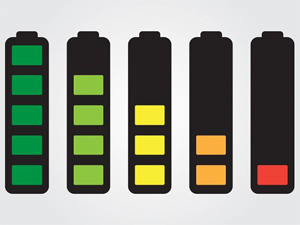



Date:05/03/18
 We're so used to having our everyday devices powered by lithium-ion batteries that sometimes it's hard to imagine using anything else. But there are plenty of teams working on alternatives like lithium-air, sodium-ion, lithium-metal and aluminum-ion designs that may help solve some of the drawbacks of lithium-ion batteries. The latest, an aqueous hybrid capacitor, is stable, safe and boasts high energy and power densities, recharging in as little as 20 seconds.
We're so used to having our everyday devices powered by lithium-ion batteries that sometimes it's hard to imagine using anything else. But there are plenty of teams working on alternatives like lithium-air, sodium-ion, lithium-metal and aluminum-ion designs that may help solve some of the drawbacks of lithium-ion batteries. The latest, an aqueous hybrid capacitor, is stable, safe and boasts high energy and power densities, recharging in as little as 20 seconds.
The new creation, out of the Korean Advanced Institute of Science and Technology (KAIST), is made with a liquid electrolyte sandwiched between a specially-designed anode and cathode. The anode is made with polymer chain materials based on graphene, which gives it a high surface area, allowing it to store more energy. The cathode material was made up of nickel oxide nanoparticles embedded on graphene.
Thanks to these materials arranged in these structures, the new device had much higher energy density and faster energy exchange than other aqueous batteries. It was far more stable with minimal energy loss, maintaining its capacity at close to 100 percent over 100,000 redox cycles.
The new device also has a power density about 100 times higher than similar designs, allowing it to be charged in 20 to 30 seconds using low-power systems like a conventional USB charger. In tests, the team hooked two of the batteries up to a flexible photovoltaic cell, and was able to power an LED, while the whole kit was worn like a sleeve.
"This eco-friendly technology can be easily manufactured and is highly applicable," says Jeung Ku Kang, co-author of a study describing the device. "In particular, its high capacity and high stability, compared to existing technologies, could contribute to the commercialization of aqueous capacitors. The device can be rapidly charged using a low-power charging system, and thus can be applied to portable electronic devices."
The research was published in the journal Advanced Energy Materials. The team demonstrates the device in the video below.
Hybrid aqueous battery charges up in under 30 seconds
 We're so used to having our everyday devices powered by lithium-ion batteries that sometimes it's hard to imagine using anything else. But there are plenty of teams working on alternatives like lithium-air, sodium-ion, lithium-metal and aluminum-ion designs that may help solve some of the drawbacks of lithium-ion batteries. The latest, an aqueous hybrid capacitor, is stable, safe and boasts high energy and power densities, recharging in as little as 20 seconds.
We're so used to having our everyday devices powered by lithium-ion batteries that sometimes it's hard to imagine using anything else. But there are plenty of teams working on alternatives like lithium-air, sodium-ion, lithium-metal and aluminum-ion designs that may help solve some of the drawbacks of lithium-ion batteries. The latest, an aqueous hybrid capacitor, is stable, safe and boasts high energy and power densities, recharging in as little as 20 seconds.The new creation, out of the Korean Advanced Institute of Science and Technology (KAIST), is made with a liquid electrolyte sandwiched between a specially-designed anode and cathode. The anode is made with polymer chain materials based on graphene, which gives it a high surface area, allowing it to store more energy. The cathode material was made up of nickel oxide nanoparticles embedded on graphene.
Thanks to these materials arranged in these structures, the new device had much higher energy density and faster energy exchange than other aqueous batteries. It was far more stable with minimal energy loss, maintaining its capacity at close to 100 percent over 100,000 redox cycles.
The new device also has a power density about 100 times higher than similar designs, allowing it to be charged in 20 to 30 seconds using low-power systems like a conventional USB charger. In tests, the team hooked two of the batteries up to a flexible photovoltaic cell, and was able to power an LED, while the whole kit was worn like a sleeve.
"This eco-friendly technology can be easily manufactured and is highly applicable," says Jeung Ku Kang, co-author of a study describing the device. "In particular, its high capacity and high stability, compared to existing technologies, could contribute to the commercialization of aqueous capacitors. The device can be rapidly charged using a low-power charging system, and thus can be applied to portable electronic devices."
The research was published in the journal Advanced Energy Materials. The team demonstrates the device in the video below.
Views: 390
©ictnews.az. All rights reserved.Similar news
- Justin Timberlake takes stake in Facebook rival MySpace
- Wills and Kate to promote UK tech sector at Hollywood debate
- 35% of American Adults Own a Smartphone
- How does Azerbaijan use plastic cards?
- Imperial College London given £5.9m grant to research smart cities
- Search and Email Still the Most Popular Online Activities
- Nokia to ship Windows Phone in time for holiday sales
- Internet 'may be changing brains'
- Would-be iPhone buyers still face weeks-long waits
- Under pressure, China company scraps Steve Jobs doll
- Jobs was told anti-poaching idea "likely illegal"
- Angelic "Steve Jobs" loves Android in Taiwan TV ad
- Kinect for Windows gesture sensor launched by Microsoft
- Kindle-wielding Amazon dips toes into physical world
- Video game sales fall ahead of PlayStation Vita launch





















